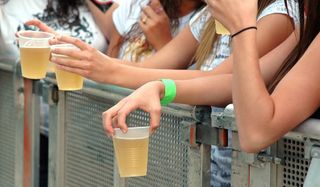Teens Who Butt Heads With Mom Better At Resisting Peer Pressure

Teens who "talk back" to Mom with a seeming expertise for expressing their views are less likely to be influenced by peer pressure than teens who just go with the flow, new research indicates.
This type of productive arguing — in which the teen tries to persuade his or her mother with reasoned arguments rather than pressure, whining or insults — seemed to influence the teen's interactions with their peers as well.
"The healthy autonomy they'd established at home seemed to carry over into their relationships with peers," study researcher Joseph Allen, of the University of Virginia, said in a statement.
Even if mom and teen disagree, strong, supportive mothering is also of key importance in resisting peer pressure. "It may be that teens who are secure in their ability to turn to their mothers under stress are less likely to end up feeling overly dependent upon their close friends, and thus less likely to be influenced by their friend's behavior when it's negative," Allen said.
Teen testing
The researchers surveyed a group of 184 seventh- and eighth-graders from urban and suburban populations in the Southeast. Their friends and parents were also surveyed and performed tasks and tests in the lab.
The teens answered questions about drug and alcohol use; their friendships and social acceptance, and also discussed or argued with their moms on a matter that prompted disagreement, while being observed in the lab. Discussions involved things like money, grades and household rules.
Sign up for the Live Science daily newsletter now
Get the world’s most fascinating discoveries delivered straight to your inbox.
The researchers analyzed their data to see what features of a teen make them more or less able to resist peer pressure. The teens' autonomy, or how independent they were and how much their parents trusted them to make their own decisions, seemed to play important roles in how they reacted when offered drugs.
If a teen indicated experiences at home in which he or she had successfully shown autonomy (their independence and ability to stick to their values in the face of someone challenging them) and felt supported by their mothers, they were more likely to report resisting peer pressure.
Peer pressures
Other influences included their best friends. If a teen's friends used drugs and or alcohol, it was more likely that that teen, particularly one without much autonomy, would pick up the habit, especially from a friend who was popular.
"Teens lacking such skills were found more likely to change their level of substance use over time in accord with their closest friend's level of substance use," the authors write, referring to teens who lacked autonomy. "We may be in danger of substantially underestimating the importance of peer influence processes if we do not account for the likelihood that such processes are far more applicable to some teens than to others."
The good news: This effect also works the other way, researchers say: "If the friend of a susceptible teen was relatively low in substance use, then that teen's use was less likely to increase over time," the authors write. "Susceptible teens might be as susceptible to positive influences from peers as to negative influences."
The study was published today (Dec. 22) in the journal Child Development.
You can follow LiveScience staff writer Jennifer Welsh on Twitter @microbelover. Follow LiveScience for the latest in science news and discoveries on Twitter @livescience and on Facebook.
Jennifer Welsh is a Connecticut-based science writer and editor and a regular contributor to Live Science. She also has several years of bench work in cancer research and anti-viral drug discovery under her belt. She has previously written for Science News, VerywellHealth, The Scientist, Discover Magazine, WIRED Science, and Business Insider.

